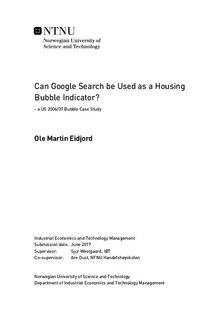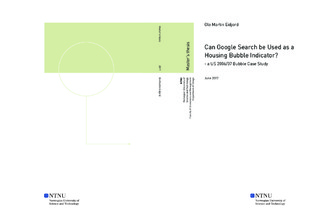| dc.description.abstract | The aim of this paper is to operationalize five out of seven points in Shiller s (2010) asset-pricing bubble checklist, using Google Trends. Our approach is two folded. First, we test search terms, related to housing, ability to indicate states experiencing a bubble. Second, we test the queries in-sample predictive ability to explain the house prices. We find that Google search for Housing Bubble can be a strong housing bubble indicator while Google search for Real Estate Agent can predict the housing trend and be included in price models to improve their predictive abilities at state levels. Due to their huge impact on the economy and the difficulty of discovering them, housing bubble indicators are of interest for academic purposes and policy makers such as banks, governments, and asset managers. | |

